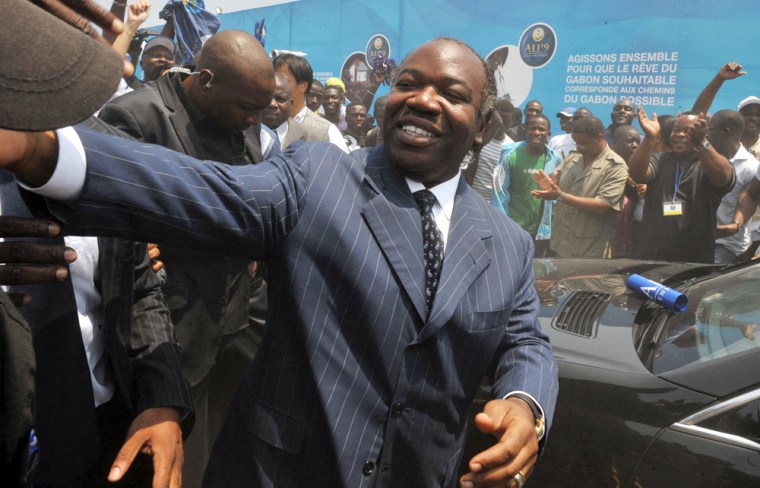The government on Thursday declared the eldest son of the late dictator Omar Bongo the winner of weekend presidential elections, enraging opposition supporters who torched a French diplomatic mission as a main opposition candidate went into hiding, nursing an injury he reportedly suffered when police fired tear gas canisters.
The anger extended outside Gabon's borders. In Dakar, Senegal, Gabonese students pushed past the sole guard at the Gabonese Embassy. A loud explosion was followed by the sound of breaking glass. The students charged out as a huge plume of smoke rose from the two-story structure.
"We want change," said one of the students. "This election is a fraud."
Even before the results of Sunday's election were announced on state TV, there was violence.
In Gabon's capital, Libreville, police fired tear gas at opposition demonstrators who had camped outside the electoral commission overnight, waiting to hear the outcome. The results had been expected Wednesday night but were delayed because the election commission disagreed on how to review province-by-province results.
Within hours of the announcement that Ali Bongo had won, opposition supporters attacked the French consulate in the oil hub of Port Gentil, 100 miles (160 kilometers) south of Libreville, setting the building alight and ransacking nearby shops, a local TV station reported.
The unrest is not likely to affect global oil prices, said Leo Drollas, chief economist at the London-based Center for Global Energy Studies, noting Gabon's small petroleum output. According to the U.S. Energy Administration, Gabon produces 247,000 barrels of oil a day, one-tenth of Nigeria's output.
Marbled palace
Demonstrators' rage was directed at France because the former colonial ruler is widely believed to have propped up the Bongo regime. At the elder Bongo's funeral in June, French President Nicolas Sarkozy and his predecessor Jacques Chirac were jeered. The dictator had squandered money on vanity projects like a marbled presidential palace and a little-used railroad instead of building roads and other infrastructure.
The demonstrators ransacked shops as they tore through Port Gentil's main market, carrying away refrigerators and TV sets. They also broke down the doors to the prison, liberating the prisoners, said Dianney Madztou, the editor-in-chief of local TV station Top Bendje.
Interior Minister Jean-Francois Ndongou said Bongo, the country's defense minister who campaigned from a private jet and plastered the capital with billboards, won with 41.7 percent of the vote.
The top two opposition leaders — Andre Mba Obame and Pierre Mamboundou — were nearly tied, receiving 25.8 and 25.2 percent of the vote respectively, Ndongou said. Obame owns a TV station, which lost its signal and was fired on earlier in the week.
Mamboundou called the election results "a fraudulent farce" and insisted that results of individual polling stations showed he had around 40 percent of the vote, with Bongo snaring less than 30.
'Fraud pure and simple'
"It's not just a possibility of fraud. It's fraud pure and simple," Mamboundou said late Wednesday when the results were supposed to have been announced by Ndongou. "The Gabonese people do not want a dynasty. Forty-two years of President Bongo is enough. They want change."
Mamboundou insisted that results of individual polling stations showed he had around 40 percent of the vote, with Bongo snaring less than 30 percent.
Louis-Gaspon Mayila, head of a political party allied to Mamboundou, said the opposition leader was injured in the arm when police fired tear gas early Thursday outside the electoral commission and had gone into hiding.
Reuters reported that Mamboundou had been "seriously injured" in clashes with security forces in Libreville.
"We condemn these results. It is a constitutional coup d'etat," said Richard Mombo, secretary general of Mamboundou's Union of Gabonese People party.
Bongo is a son of dictator Omar Bongo, who ruled this African nation for 41 years.
Artillery attack on TV station
Ali Bongo, 50, held senior posts for years in his father's Cabinet and was appointed foreign minister in 1989. Since 1999, he has been defense minister.
On Sunday, a television channel owned by Obame inexplicably lost its signal. The station borrowed equipment to broadcast the election results but around 3:30 a.m. Wednesday, masked men opened fire with artillery on the station, damaging its satellite uplink, said station manager Franck Nguema.
"This is an obvious attempt by the government to stop us from transmitting election results," he said.
Analyst Almami Cyllah of the International Foundation for Electoral Systems expressed doubts about the legitimacy of the electoral roll of 800,000 registered voters in a nation of 1.5 million population where 40 percent of the population is under 15 and the voting age is 21.
Election Commission President Renee Aboghe Ella has acknowledged the voter list appears inflated and expressed concern that a winner may be declared without securing a majority, which "could create a problem of legitimacy."
Unlike many African nations, in Gabon a candidate needs to only obtain the most votes to win, and not more than 50 percent of the vote.
The dispute comes after polls this year in Niger, Congo Republic and elsewhere in the region where incumbent leaders have been accused of rigging results to stay in power.
More on: Gabon
